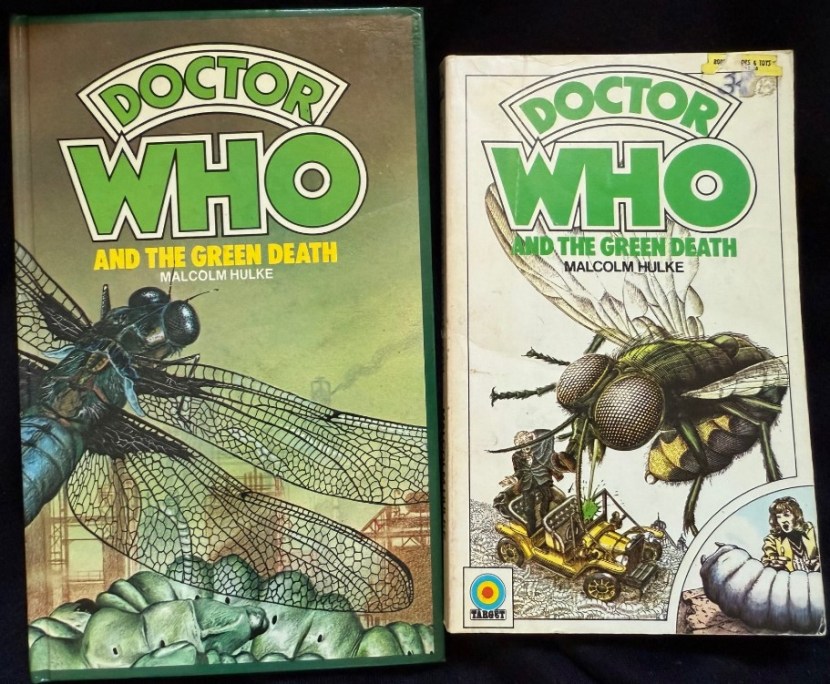Doctor Who And… 15: The Green Death (21/8/1975)
Written by Malcolm Hulke, based on Robert Sloman’s scripts for the 1973 TV serial.

Malcolm Hulke’s only novelisation of a script he didn’t write, and like his other books it takes the TV serial as a starting point, nipping, tucking and reworking plot and character in service of a punchier read. The result is recognisably Sloman’s story but with some sequences, such as the slag heap scenes, condensed and others, including the Doctor’s traumatic visit to Metebelis 3, expanded (to include blue unicorns, venomous flowers and a living forest).
As you’d expect from Hulke, the class element is strongly evident, with hard-working former miners pitted against Panorama Chemicals’ director Stevens in his chauffeur-driven car enjoying expensive hotel meals: “Dr Stevens was always impressed with success because he was a snob”. The miners are fairly philosophical about their lot in life, but there is an undercurrent of sharp commentary in the way the capitalist economy exploits them: “’The workers have always had bosses,’ said Dai Evans, ‘People who live off our backs, so we might as well accept that.’”
Hulke is critical of the government’s short-sightedness on the economy and environmental issues, and the prioritisation of near-term profit over long-term sustainability. Like IMC in Doctor Who and the Doomsday Weapon, Panorama Chemicals has friends in high places, and can bring pressure to bear to ensure its own interests win out over the livelihoods of the folk of Llanfairfach. This is probably Hulke’s most politically charged book, and it’s hard not to agree with at least some of his criticisms.
Elsewhere, his characterisation is as astute as always. Stevens, controlled by the self-aware megalomaniac computer BOSS, has occasionally rebellious thoughts of freedom (such as running away into the Welsh mountains), but is kept very firmly under the thumb – there’s a very curious moment where BOSS coyly describes its union with Stevens as a “marriage” and begins to hum the wedding march. Stevens’ associates include Dr Bell, whose Christian principles conflict with BOSS’ brainwashing, and he quotes the Bible and appeals to Jesus as he is driven mad. In a slightly less interesting bit of thumbnail characterisation, the sadistic henchman Hinks is obsessed with American horror comics.
The regulars get some great moments – apart from the abovementioned detour to Metebelis 3, the Doctor’s growing awareness of Jo’s own break for freedom is sensitively handled. Jo’s romance with Professor Cliff Jones is written as screwball comedy, with her feminist principles coming out as she threatens to bring him in a cup of tea “topless”, and Cliff yelling his love for her at the top of his voice as they hunt maggots during an aerial attack. The Doctor’s jealousy of Cliff is well done, as he feels “childish satisfaction” in spoiling their date. Meanwhile, Jo pities the Doctor’s loneliness. “’He knows I’ve fallen in love,’ she thought to herself. She felt rather sorry for the Doctor, and wondered why he had never married. Were there, she wondered, lady Time Lords?” The closing moments don’t exactly replicate the end of the TV version, but maintain its spirit.
The end result is rather wonderful, as if Hulke has been more liberated than usual through adapting someone else’s work. Unhesitatingly Grade 1.

Next Time: Doctor Who And… The Planet of the Spiders.
One comment